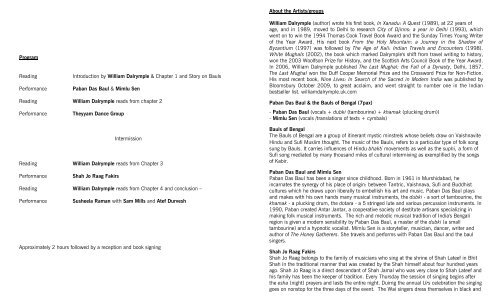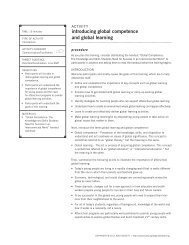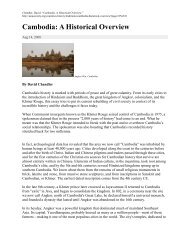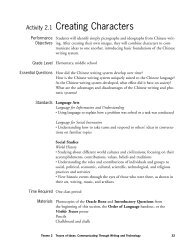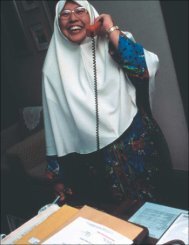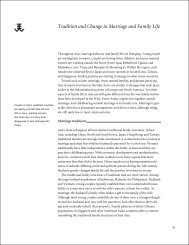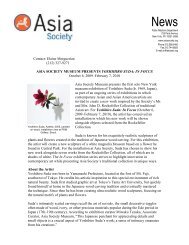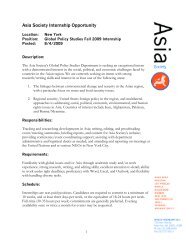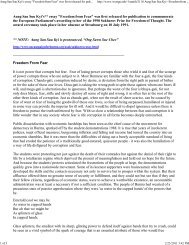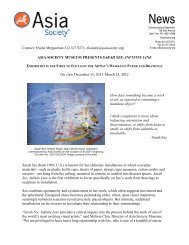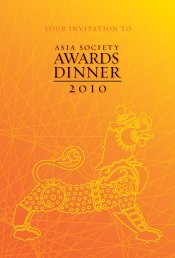Pg notes - Nine Lives- For Web - Asia Society
Pg notes - Nine Lives- For Web - Asia Society
Pg notes - Nine Lives- For Web - Asia Society
You also want an ePaper? Increase the reach of your titles
YUMPU automatically turns print PDFs into web optimized ePapers that Google loves.
Program<br />
Reading Introduction by William Dalrymple & Chapter 1 and Story on Bauls<br />
Performance Paban Das Baul & Mimlu Sen<br />
Reading William Dalrymple reads from chapter 2<br />
Performance Theyyam Dance Group<br />
Intermission<br />
Reading William Dalrymple reads from Chapter 3<br />
Performance Shah Jo Raag Fakirs<br />
Reading William Dalrymple reads from Chapter 4 and conclusion –<br />
Performance Susheela Raman with Sam Mills and Atef Durvesh<br />
Approximately 2 hours followed by a reception and book signing<br />
About the Artists/groups<br />
William Dalrymple (author) wrote his first book, In Xanadu: A Quest (1989), at 22 years of<br />
age, and in 1989, moved to Delhi to research City of Djinns: a year in Delhi (1993), which<br />
went on to win the 1994 Thomas Cook Travel Book Award and the Sunday Times Young Writer<br />
of the Year Award. His next book From the Holy Mountain: a Journey in the Shadow of<br />
Byzantium (1997) was followed by The Age of Kali: Indian Travels and Encounters (1998).<br />
White Mughals (2002), the book which marked Dalrymple's shift from travel writing to history,<br />
won the 2003 Woolfson Prize for History, and the Scottish Arts Council Book of the Year Award.<br />
In 2006, William Dalrymple published The Last Mughal: the Fall of a Dynasty, Delhi, 1857.<br />
The Last Mughal won the Duff Cooper Memorial Prize and the Crossword Prize for Non-Fiction.<br />
His most recent book, <strong>Nine</strong> <strong>Lives</strong>: In Search of the Sacred in Modern India was published by<br />
Bloomsbury October 2009, to great acclaim, and went straight to number one in the Indian<br />
bestseller list. williamdalrymple.uk.com<br />
Paban Das Baul & the Bauls of Bengal (7pax)<br />
- Paban Das Baul (vocals + dubki (tambourine) + khamak (plucking drum))<br />
- Mimlu Sen (vocals /translations of texts + cymbals)<br />
Bauls of Bengal<br />
The Bauls of Bengal are a group of itinerant mystic minstrels whose beliefs draw on Vaishnavite<br />
Hindu and Sufi Muslim thought. The music of the Bauls, refers to a particular type of folk song<br />
sung by Bauls. It carries influences of Hindu bhakti movements as well as the suphi, a form of<br />
Sufi song mediated by many thousand miles of cultural intermixing as exemplified by the songs<br />
of Kabir.<br />
Paban Das Baul and Mimlu Sen<br />
Paban Das Baul has been a singer since childhood. Born in 1961 in Murshidabad, he<br />
incarnates the synergy of his place of origin: between Tantric, Vaishnava, Sufi and Buddhist<br />
cultures which he draws upon liberally to embellish his art and music. Paban Das Baul plays<br />
and makes with his own hands many musical instruments, the dubki - a sort of tambourine, the<br />
khamak - a plucking drum, the dotara - a 5 stringed lute and various percussion instruments. In<br />
1990, Paban created Antar Jantar, a cooperative society of destitute artisans specializing in<br />
making folk musical instruments. The rich and melodic musical tradition of India's Bengali<br />
region is given a modern sensibility by Paban Das Baul, a master of the dubki (a small<br />
tambourine) and a hypnotic vocalist. Mimlu Sen is a storyteller, musician, dancer, writer and<br />
author of The Honey Gatherers. She travels and performs with Paban Das Baul and the baul<br />
singers.<br />
Shah Jo Raag Fakirs<br />
Shah Jo Raag belongs to the family of musicians who sing at the shrine of Shah Lateef in Bhit<br />
Shah in the traditional manner that was created by the Shah himself about four hundred years<br />
ago. Shah Jo Raag is a direct descendant of Shah Jamal who was very close to Shah Lateef and<br />
his family has been the keeper of tradition. Every Thursday the session of singing begins after<br />
the esha (night) prayers and lasts the entire night. Duirng the annual Urs celebration the singing<br />
goes on nonstop for the three days of the event. The Wai singers dress themselves in black and


